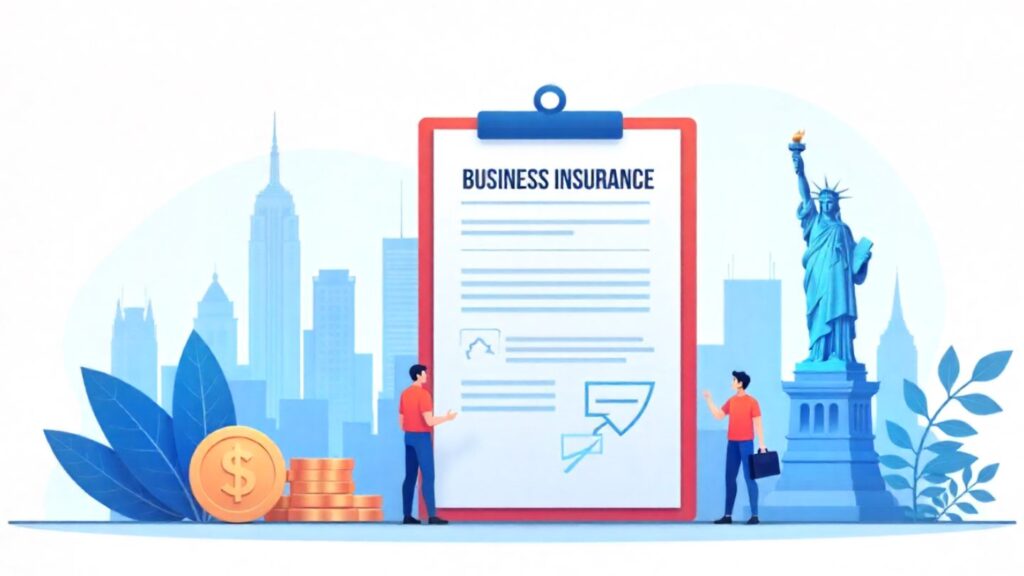- Types of Business Insurance in the USA
- How Much Does Business Insurance Cost?
- How to Choose the Right Business Insurance
- Legal Requirements by State or Industry
- Top Business Insurance Providers in the USA
- Benefits of Having Business Insurance
- Final Tips Before You Buy Business Insurance
- Frequently Asked Questions
Business insurance is a safeguard that protects companies from financial losses caused by unexpected events such as lawsuits, property damage, accidents, or employee injuries. It is not a one-size-fits-all product but rather a collection of coverages tailored to the specific risks of your business.
Almost every business, whether a freelancer, startup, or established company, can benefit from insurance. If you own property, employ staff, or serve clients, having coverage is a smart and often necessary choice.
Beyond compliance, insurance builds trust with clients, helps secure contracts, and ensures continuity during disruptions. It also provides legal and financial protection that can make or break a business during a crisis.
Types of Business Insurance in the USA
Understanding the main types of business insurance available in the USA helps business owners make informed decisions based on their risks and needs. Each policy provides a specific kind of protection, and in many cases, combining multiple types offers broader coverage and cost efficiency.
General Liability Insurance
General liability insurance covers claims of third-party bodily injury, property damage, or advertising-related harm. If a customer slips and falls at your business location, this policy helps cover medical expenses and legal fees. It is one of the most common types of coverage and is often required in commercial contracts and leases.
Commercial Property Insurance
This policy protects physical assets owned or leased by your business, such as buildings, inventory, equipment, and furniture. It typically covers losses caused by fire, theft, vandalism, or certain natural disasters. Retail stores, manufacturers, and offices with valuable equipment often carry this type of insurance.
Business Owner’s Policy (BOP)
A BOP combines general liability and commercial property insurance into a single, more affordable package. Many insurers also include business interruption coverage, which replaces lost income if your operations are suspended due to a covered event. Small to midsize businesses benefit most from this bundled option, especially when budget is a concern.
Workers’ Compensation Insurance
Most states require businesses with employees to carry workers’ compensation insurance. It covers medical costs, lost wages, and rehabilitation expenses if an employee gets injured or becomes ill due to their job. It also protects employers from lawsuits related to workplace injuries.
Professional Liability Insurance (Errors and Omissions)
Professional liability insurance, often called E&O insurance, protects service-based businesses from claims of negligence, mistakes, or failure to deliver promised services. It is essential for consultants, IT professionals, accountants, designers, and anyone whose advice or service could lead to financial loss for a client.
Cyber Liability Insurance
Cyber liability insurance helps businesses recover from data breaches, cyberattacks, or accidental data exposure. It typically covers legal fees, notification costs, forensic investigations, and sometimes extortion demands. With increasing reliance on digital systems, even small businesses should consider this coverage.
Commercial Auto Insurance
This policy covers vehicles used for business purposes, including cars, vans, and trucks. It pays for damage to the vehicle, third-party injuries, and property damage resulting from an accident while on the job. Personal auto insurance usually excludes business use, making this coverage vital for delivery services, tradespeople, and mobile teams.
Product Liability Insurance
If your business manufactures or sells physical products, product liability insurance protects against claims that a product caused injury or damage. Coverage may include legal defense and settlement costs. This type of insurance is especially important in industries such as food, electronics, apparel, or children’s toys.
Umbrella Insurance
Umbrella insurance provides additional liability coverage beyond the limits of your existing policies, such as general liability or commercial auto. It acts as a financial safety net in high-cost lawsuits or catastrophic claims. Businesses that face higher legal exposure, such as contractors or companies working in public spaces, often choose this extra layer of protection.
How Much Does Business Insurance Cost?
The cost of business insurance in the USA varies based on several important factors, including the type of coverage, the nature of the business, and the level of risk involved. While small businesses may pay as little as $30 per month for basic liability coverage, more comprehensive protection often costs significantly more.
Average Business Insurance Costs by Policy Type
These are the typical monthly premiums for common types of business insurance:
| Policy Type | Average Monthly Cost |
|---|---|
| General Liability Insurance | $40 to $60 |
| Business Owner’s Policy (BOP) | $50 to $100 |
| Commercial Property Insurance | $60 to $120 |
| Workers’ Compensation | $45 to $110 |
| Commercial Auto Insurance | $130 to $200 |
| Professional Liability (E&O) | $60 to $90 |
| Cyber Liability Insurance | $130 to $250 |
| Product Liability Insurance | $80 to $120 |
| Umbrella Insurance | $75 to $150 |
Note: Prices vary by provider, state, and business risk profile.
Key Factors That Influence Insurance Costs
Several variables determine how much you will pay for business insurance. Understanding these helps business owners prepare for realistic budgeting and avoid surprises during the quoting process.
1. Industry Type
Businesses in higher-risk sectors, such as construction, healthcare, and manufacturing, often pay more than those in lower-risk fields like consulting or web development. Risk exposure directly affects the cost of coverage.
2. Number of Employees
A larger team increases the chance of workplace incidents, leading to higher premiums for policies like workers’ compensation and general liability. More employees may also mean higher payroll, which many insurers consider when pricing coverage.
3. Business Location
Where your business operates affects your rates. Urban areas, disaster-prone regions, or states with high litigation rates can all lead to higher insurance costs. For example, property insurance may cost more in coastal states prone to hurricanes.
4. Claims History
A clean record with few or no past claims can result in better rates. Insurers often raise premiums for businesses with a history of frequent or large claims, as this signals a higher risk of future losses.
5. Coverage Limits and Deductibles
Choosing higher coverage limits gives your business more protection, but it also increases the cost. Conversely, selecting a higher deductible can reduce your premium, though you’ll pay more out of pocket if you file a claim.
Tips to Reduce Business Insurance Premiums
There are practical ways to manage and lower your insurance expenses without compromising on protection:
- Bundle your policies. A Business Owner’s Policy (BOP) typically costs less than buying liability and property coverage separately.
- Pay annually instead of monthly to access full-payment discounts.
- Improve workplace safety. Regular safety training, security systems, and maintenance logs can help reduce your risk and lower premiums.
- Shop around and compare quotes. Rates can vary widely between providers, so get quotes from at least three reputable insurers.
- Review your coverage yearly. As your business grows or changes, you may find ways to optimize your insurance and avoid overpaying for outdated protection.
How to Choose the Right Business Insurance
Choosing the right business insurance is not just about meeting legal requirements. It is about ensuring your company can survive financial setbacks, lawsuits, or operational disruptions. The right policy provides a safety net tailored to your risks, resources, and long-term goals. Here is how to make an informed and confident decision.
Evaluate Your Business Risks
Start by identifying the specific risks your business faces. A contractor may need coverage for on-site injuries and equipment loss, while a web developer may be more concerned about professional liability or cyberattacks. Think about your operations, location, industry standards, and regulatory obligations. A risk assessment helps determine which policies are essential and which can be optional.
Compare Quotes from Multiple Insurers
Prices and coverage vary significantly between insurance providers. Comparing quotes helps you understand market rates and ensures you are not overpaying for the same protection. Look for clear policy language, exclusions, and limits. It is also helpful to check insurer ratings for financial strength and customer service, which play a critical role if you ever need to file a claim.
Look for Bundled Coverage Options
Many small to midsize businesses benefit from bundled policies such as a Business Owner’s Policy (BOP). A BOP typically combines general liability, property coverage, and business interruption protection at a lower cost than purchasing separate policies. Bundling not only reduces premiums but also simplifies policy management.
Use a Licensed Commercial Insurance Broker
An experienced commercial insurance broker can offer personalized advice based on your business model, size, and location. Brokers work with multiple insurers, which allows them to compare options on your behalf. Unlike agents tied to one company, independent brokers help you find competitive pricing and appropriate coverage without sales pressure.
Final Thought
Choosing the right insurance is not a one-time task. As your business evolves, your insurance needs will too. Review your policies annually and adjust coverage as you grow, hire employees, offer new services, or move to a different location.
Legal Requirements by State or Industry
Not all business insurance is optional. In many cases, laws at the state or industry level require specific types of coverage. Failing to comply can result in fines, lawsuits, or the inability to operate legally. Understanding these obligations helps protect your business from costly legal issues and ensures you meet industry standards.
Is Business Insurance Legally Required?
In most states, certain types of business insurance are mandatory. The most common requirements include:
- Workers’ Compensation Insurance: Nearly every state requires businesses with one or more employees to carry workers’ compensation. This policy covers medical expenses and lost wages if an employee is injured on the job.
- Commercial Auto Insurance: If your company owns vehicles, most states require a commercial auto policy. It must meet minimum liability limits set by local laws.
- Unemployment Insurance: Employers must register and pay into their state’s unemployment insurance program, which provides temporary benefits to eligible workers who lose their jobs.
Some states may also mandate disability insurance or health coverage depending on the number of employees and the type of business.
Industry-Specific Mandates
Certain industries face higher operational risks and are therefore subject to additional insurance requirements. Here are a few examples:
- Construction: Contractors often need general liability, workers’ compensation, and sometimes surety bonds to meet state licensing standards or bid on projects.
- Food Services: Restaurants may be required to carry product liability, liquor liability (if serving alcohol), and commercial property insurance for fire or equipment-related risks.
- Healthcare: Medical professionals must carry malpractice insurance, which covers claims of negligence or medical error.
- Transportation and Logistics: Businesses that operate fleets may need cargo insurance or higher auto liability limits.
- Childcare Services: Centers often must carry both liability and abuse coverage to meet state licensing regulations.
Even when a policy is not legally required, some clients, landlords, or vendors may demand proof of insurance before entering into contracts or agreements.
Know Your State’s Rules
Each state sets its own insurance rules for businesses. To stay compliant, visit your state’s Department of Insurance website or speak with a licensed commercial broker familiar with your industry and location. They can guide you through specific requirements and help you avoid unnecessary penalties.
Top Business Insurance Providers in the USA
Choosing a reliable insurance provider is just as important as selecting the right coverage. The best business insurance companies offer strong financial stability, flexible policy options, competitive pricing, and dependable customer support. Below are five well-regarded insurers that serve a wide range of U.S. businesses.
1. Next Insurance
Overview: Next Insurance specializes in small business policies with a digital-first approach. It allows business owners to get quotes, purchase coverage, and manage policies entirely online.
Pros:
- Fast online application and instant certificates of insurance
- Monthly payment options
- Tailored coverage for freelancers, contractors, and small business owners
Cons:
- Limited availability for certain high-risk industries
- No local agents for in-person support
2. Hiscox
Overview: Hiscox offers business insurance in all 50 states and focuses on professional service providers such as consultants, IT firms, and marketing agencies.
Pros:
- Strong coverage for small service-based businesses
- Available through direct purchase or licensed brokers
- Customizable policies with affordable starting rates
Cons:
- Higher premiums for some industries
- Less suitable for businesses with complex operations or higher liability
3. The Hartford
Overview: The Hartford is one of the oldest and most trusted names in commercial insurance. It serves both small and midsize businesses across a wide range of industries.
Pros:
- Excellent financial strength and claims support
- Broad selection of policies, including BOP, workers’ compensation, and cyber coverage
- Strong reputation for customer satisfaction and risk management resources
Cons:
- May require working with an agent for policy setup
- Some coverages not available in every state
4. Travelers
Overview: Travelers provides commercial insurance solutions for businesses of all sizes, from small startups to large enterprises. It offers robust underwriting for industry-specific risks.
Pros:
- Wide range of coverage options
- Strong financial backing and long-standing industry presence
- Offers in-depth risk control tools for high-exposure sectors
Cons:
- May involve more paperwork and slower onboarding
- Rates can be higher for small businesses with minimal risk exposure
5. Chubb
Overview: Chubb is known for its premium coverage and is ideal for businesses with significant assets or complex insurance needs.
Pros:
- High policy limits and tailored underwriting
- Strong global network and claims responsiveness
- Offers specialized insurance for technology, healthcare, and manufacturing
Cons:
- Premiums are typically higher than average
- Less ideal for very small businesses or solopreneurs
Benefits of Having Business Insurance
Business insurance is more than a safety net. It plays a central role in long-term stability, risk management, and professional credibility. Whether you operate a one-person consultancy or manage a growing company, the right coverage can help you recover from setbacks and protect your reputation.
Legal and Financial Protection
Lawsuits, accidents, and unexpected losses can severely disrupt or even bankrupt a business. Insurance helps cover legal defense costs, court judgments, medical expenses, and property repairs.
For example, general liability insurance protects against third-party injury claims, while cyber liability helps with expenses after a data breach. Without proper coverage, a single incident could result in significant out-of-pocket costs.
Credibility and Client Confidence
Many clients and vendors prefer to work with insured businesses. Carrying appropriate insurance demonstrates responsibility and professionalism, which builds trust.
For industries like construction, IT, or consulting, showing proof of insurance may be a requirement before contracts are signed. It gives clients peace of mind knowing they are protected if something goes wrong.
Business Continuity
A fire, natural disaster, or major theft could halt operations for days or weeks. Business interruption coverage, often included in a Business Owner’s Policy, helps replace lost income during closures caused by a covered event.
This support allows you to pay bills, meet payroll, and maintain operations while recovering. It ensures your business stays afloat even in difficult times.
Compliance with Contracts or Lease Agreements
Many commercial landlords, lenders, or partners require proof of insurance before entering into agreements. General liability, property coverage, and workers’ compensation are often standard requirements in lease contracts, loan documents, or client service agreements. Meeting these terms not only keeps your business compliant but also helps you secure partnerships and growth opportunities.
Final Tips Before You Buy Business Insurance
Before finalizing your business insurance policy, take a moment to review the finer details. A thoughtful approach can help you avoid coverage gaps, reduce long-term costs, and ensure your policy evolves with your business.
Choose Between Annual and Monthly Premiums
Many insurers offer a discount when you pay your premium annually instead of monthly. While monthly payments may seem more manageable in the short term, they often come with higher processing fees. If your budget allows, consider paying in full to save money over time.
Understand Policy Exclusions
Every insurance policy has exclusions that limit what is covered. For example, general liability may not cover employee injuries, and property insurance may not protect against certain natural disasters unless added separately. Always read the policy documents carefully or ask your insurer to explain what is and isn’t included. This step prevents costly surprises during a claim.
Keep Your Business Information and Documents Updated
Accurate and current documentation helps ensure your coverage reflects your business as it stands today. Notify your insurer of changes such as new hires, added services, office relocations, or major purchases. Keeping your records up to date can also speed up the claims process and avoid disputes over eligibility.
Reassess Your Coverage Each Year
Your insurance needs can change as your business grows. A policy that worked during your first year may not be sufficient once you expand, hire staff, or offer new services.
Review your policies annually to adjust coverage limits, add endorsements, or explore better pricing options. An annual review ensures your coverage stays aligned with your actual risk exposure.
Frequently Asked Questions
What is business insurance and why is it important?
Business insurance is a financial safety net that helps protect companies from unexpected losses due to events such as lawsuits, natural disasters, property damage, or workplace injuries. Without proper coverage, a single incident could lead to costly legal fees or even force a business to close. Having insurance ensures stability and allows owners to focus on growth with less risk.
Is business insurance mandatory in the USA?
Business insurance is not universally required by federal law, but specific types of coverage are legally mandated in many states or industries. For example, most states require businesses with employees to carry workers’ compensation insurance. Certain contracts, leases, or professional licenses may also require liability or commercial auto coverage.
How much does small business insurance cost in the USA?
The cost of small business insurance varies based on industry, location, business size, and risk level. On average, it ranges from $30 to $200 per month. A sole proprietor might pay on the lower end, while a growing business with employees and physical assets may need broader coverage that costs more.
What’s included in a Business Owner’s Policy (BOP)?
A Business Owner’s Policy combines several key coverages into one affordable package. Most BOPs include general liability insurance, commercial property insurance, and business interruption insurance. Some providers allow you to customize the policy by adding endorsements like cyber liability or professional liability, depending on your needs.
What’s the best business insurance for a startup?
Startups often begin with general liability insurance to cover basic risks such as customer injuries or legal claims. A BOP is also a common starting point since it offers bundled protection for both liability and property. Tech startups and businesses handling sensitive data should also consider cyber liability insurance to protect against data breaches and online threats.



